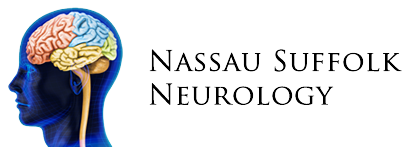Neurologist in Suffolk County

A neurological disorder is a disorder of the body’s nervous system. They affect the brain and the nerves that are throughout the spinal cord and body. They can be organized according to the location affected, the type of cause, or the type of dysfunction involved. There are over 600 neurological disorders that affect millions of people each year. These disorders can leave patients extremely debilitated especially if gone untreated. If you or someone you know suffers from a neurological disorder and is searching for a neurologist in Suffolk County, contact Nassau Suffolk Neurology today!
Common Neurological Diseases:
Epilepsy – occurs as a result of unusual brain activity. It causes seizures, loss of awareness, unusual behavior, and sensations.
Stroke – It is caused by the blockage of blood flow or rupture of an artery to the brain.
Parkinson’s disease – Affects the central nervous system. The cells of your substantia nigra start to die which causes your dopamine levels to drop. It causes walking problems, balancing problems, slow movements, tremors, and rigid muscles.
Alzheimer’s disease – Prevents parts of the cell’s factory from running well. It causes problems with your thinking process, behavior, and memory.
Multiple Sclerosis – A disorder of the central nervous system that causes numbness, weakness, loss of muscle coordination, vision problems, and speech problems.
Brain Tumors – A buildup of abnormal cells in your brain.
A Neurologist in Suffolk County at Nassau Suffolk Neurology believes your health is a top priority. Dr. Anthony Adamo is dedicated to maintaining the highest standards of clinical excellence. He provides each patient with the respect and care that they deserve.
Tests available With A Neurologist in Suffolk County:
EEG – Used to evaluate the brain’s electrical activity.
EMG/NCV – Diagnostic tests used to evaluate muscle and nerve activity.
BAER – Shows how your brain processes sound. This test can reveal if a person is undergoing hearing loss.
Balance Testing – Testing your physical balance.
VER – Examines parts of the brain that are used to process vision. Evaluates visual symptoms such as double vision.
ANS Study – Evaluates your unconscious decisions such as breathing, bodily processes, and your heartbeat. ANS problems can occur in Parkinson’s and Diabetes.
Neurologist in Suffolk County
If you are experiencing symptoms such as headaches, weakness, numbness/tingling, vision problems, seizures, etc. you may want to see a neurologist. To get the best care possible contact Nassau Suffolk Neurology, our neurologist in Suffolk County. Do not wait! Call 631-422-8822!
Have you noticed your loved one acting a little forgetful lately? Forgetting a conversation or your keys is common at times, but something might be manifesting if this is occurring more frequently. You or your loved one could be suffering from an early stage of dementia or memory loss. Although dementia is not a specific disease, many factors may cause dementia and memory loss or other functions. In the search for a certified, knowledgeable, and experienced neurologist in Suffolk County? Look no further; Nassau Suffolk Neurology is here for you. Continue reading on to learn more about dementia, memory loss, and how a neurologist may help you through this tough diagnosis.
What Can Cause Dementia?
Dementia is simply a result of brain disease, and most definitely not a normal component of aging. Furthermore, dementia describes the loss of cognitive functions, which can be so severe that they interfere with an individual’s way of life, daily activities, and movements. Dementia is also known as the more general term when describing the loss of memory, language, and thinking abilities in an individual. In most cases, an individuals’ memory doesn’t all diminish at the same time. This condition is very low and progresses over time, most likely due to the gradual loss of brain cells (neurons), otherwise known as neurodegeneration.
Memory Loss Explained, Separate From Dementia
Sometimes your diagnosis is, in fact, not dementia. Your neurologist in Suffolk County carefully examines your symptoms, medical history, mental status, and more. Sometimes, they don’t line up with Alzheimer’s Disease or any type of dementia. Instead, your neurologist may suggest that you are suffering from mild cognitive impairment (MCI). MCI is known as the stage between the expected memory loss due to aging and the more serious decline of memory due to dementia and other brain diseases. Individuals with mild cognitive impairment are most likely aware of their memory and mental functions diminishing over time. These changes may be noticeable to the individual, their family, and friends; however, these slight changes aren’t big enough to impact the individual’s daily life and activities at all. In some cases, mild cognitive impairment may increase and personal risk of developing dementia in the future. However, some people’s MCI never worsens and sometimes gets better in the long run.
Diagnosing Mild Cognitive Impairment or MCI
Because there is no specific test to diagnose mild cognitive impairment, your neurologist in Suffolk County again bases everything on your symptoms, reports, and evaluations. Curated by an international panel of neurologists, the criteria for diagnosing mild cognitive impairment or MCI is as followed:
-
- The individual has problems with memory or any other type of mental function.
- Their medical history reveals a great decline in ability over time.
- Their overall mental function, as well as daily activities, don’t seem to be impacted.
- Mental status testing shows a very mild or slight impairment for the individual’s age or education level.
Risk Factors Linked to Cognition
There are a bunch of risk factors that can influence your cognitive function as a whole. Granted, some things cannot be changed; however, others can be addressed and dealt with to reduce your overall risk over time. Risks include but are not limited to:
-
- Age
- Family history
- Down Syndrome
- Diet and exercise
- Alcohol intake
- Depression
- Diabetes
- Smoking
- Sleep Apnea
- Vitamin and nutritional deficiencies

